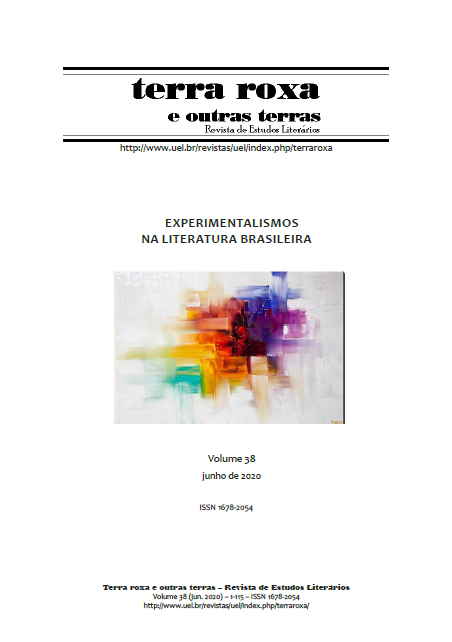The other-poetry of Carlito Azevedo
DOI:
https://doi.org/10.5433/1678-2054.2020v38p90Keywords:
Modernity and contemporary, Experimentalism, Lyric poetry, Carlito AzevedoAbstract
The tradition of rupture and the dissonance tension around lyric modernity establishes the crisis as the founder element about modern experience. Innovations and experimentalisms in poetic composition made by negative, abnormal and obscure categories signed as brands of that poetry since Baudelaire. The verse crisis traces elements in modern lyrical feel are linked to the autorreflexivity tendencies, simulacrum, deterritorialization, deconstruction and hybridism all of them as symptoms of contemporary poetries. Carlito Azevedo is one of the main names of recent Brazilian poetry whose poetic causes strangeness and fascination at the same time in readers by unspecified character of his poetry. With the intention to investigate the experiments of fluminense poet, checking our eyes in time, discourses and elements used as the material of the poetry, we are going to read the Livro das postagens, published in 2016, compound by two poems that contest the notion of lyric poetry.Downloads
References
AGAMBEN, Giorgio. O homem sem conteúdo. Trad. Cláudio Oliveira. Belo Horizonte: Autêntica, 2012a.
AZEVEDO, Carlito. Livro das postagens. Rio de Janeiro: 7 Letras, 2016.
AZEVEDO, Carlito. Monodrama. Rio de Janeiro: 7 Letras, 2009.
AZEVEDO, Carlito. Sublunar. Rio de Janeiro: 7 Letras, 2001.
BÜRGER, Peter. Teoria da vanguarda. Trad. José Pedro Antunes. São Paulo: Cosac Naify, 2008.
FRIEDRICH, Heinrich. Estrutura da lírica moderna: da metade do século XIX a meados do século XX. Trad. Marise M. Curioni. São Paulo: Duas Cidades, 1978.
GARRAMUÑO, Florencia. As práticas da impertinência. Frutos estranhos: sobre a inespecificidade na estética contemporânea. Trad. Carlos Nougué. Rio de Janeiro: Rocco, 2014, pp. 9-29.
GARRAMUÑO, Florencia. O império dos sentidos: poesia, cultura e heteronomia. Célia Pedrosa & Ida Alves. Subjetividades em devir: estudos de poesia moderna e contemporânea. Rio de Janeiro: 7 Letras, pp. 82-91.
GARRAMUÑO, Florencia. O passo de prosa na poesia contemporânea. Frutos estranhos: sobre a inespecificidade na estética contemporânea. Trad. Carlos Nougué. Rio de Janeiro: Rocco, 2014, p. 49 – 81.
MARTELO, Rosa Maria. Poesia e des-equilíbrios. A forma informe: leituras de poesia. Lisboa: Assírio & Alvim, 2010, pp. 9-18.
MORICONI, Italo. Poesia e crítica, aqui e agora (ensaio de vocabulário). Beatriz Resende & Ettore Finazzi-Agró. Possibilidades da nova escrita literária no Brasil. Rio de Janeiro: Revan, 2014, pp. 81-90.
SISCAR, Marcos. Poesia e crise: ensaios sobre a “crise da poesia como topos da modernidade. Campinas: Editora da Unicamp, 2010.
SÜSSEKIND, Flora. A imagem em estações – observações sobre “Margens”, de Carlito Azevedo. Célia Pedrosa & Ida Alves. Subjetividades em devir: estudos de poesia moderna e contemporânea. Rio de Janeiro: 7 Letras, pp. 63-81.
Downloads
Published
How to Cite
Issue
Section
License
Copyright (c) 2020 Terra Roxa e Outras Terras: Revista de Estudos Literários

This work is licensed under a Creative Commons Attribution 4.0 International License.
Authors who publish in this journal agree to the following terms:
a) The authors retain the copyright and grant the journal the right of first publication, the work being simultaneously licensed under the Creative Commons Attribution-NonCommercial 4.0 International License, allowing the sharing of the work with acknowledgment of the authorship of the work and initial publication in this journal.
b) Authors are authorized to assume additional contracts separately, for non-exclusive distribution of the version of the work published in this journal (eg, publish in an institutional repository or as a book chapter), with acknowledgment of authorship and initial publication in this journal.
c) Authors are allowed and encouraged to publish and distribute their work online (e.g. in institutional repositories or on their personal page) after the editorial process, as this can generate productive changes as well as increase impact and citation of the published work (See The Effect of Open Access).
d) The authors of the approved works authorize the journal to, after publication, transfer their content for reproduction in content indexers, virtual libraries and the like.
e) The authors assume that the texts submitted for publication are of their original creation, taking full responsibility for their content in case of any objection by third parties.



















